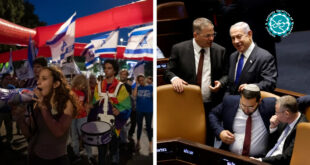On the other hand, possible factors for such fear are cultural and economic domination and so on, which unsettle healthy mutual relations, leading to domination over others. A major cause of anxiety and worry in this regard are the policies and stances of the mass media, which present a distorted image about Muslim societies. Do you know what we should fear? We should fear ignorance. As has been mentioned in both the Islamic as well as Christian traditions, ignorance is a great source of fear and conflict. Thus, Mutanabbi says:
There is a treatment for any illness except ignorance, which has made anyone who wants to heal it incapable.
The world is shrouded by a thick veil that does not permit us to be informed about the true nature and conditions of each other and of what we Muslims and Christians share in common, especially in our holy books. Without knowledge and recognition of these commonalities we will be incapable of having a mutually-enriching and beneficial religious, cultural and economic life.
I believe that if we Muslims and Christians cannot successfully achieve an agreement about the things that unite us, future human beings and history itself will not forgive us, for this agreement is really indispensable.
Do you presume that we need anything more than what is mentioned in our holy books for proving our religious brotherhood as followers of the Prophet Abraham (pbuh)?! All of us are the children of Abraham (pbuh), the special friend of God, who preached the divine religion, which the Qur’an indicates is the religion of pure essence of Nature.
It is obligatory for me to acknowledge those who have organized this conference, especially Professor Galtung, the respected director of the conference, who made several very valid points with excellent precision.
Ending the Crusades
The declaration of the Conference on Islam and Christianity
The Announcement of Peace
We have gathered in here, in Biel/Bienne, Switzerland, on November 27th, 1995 according to the Christian calendar. Nine hundred years ago, in 1095, Pope Urban II, launched the first Crusade, the first of a series that finally gave over nearly two centuries later, in 1291. Yet, we have never had a real announcement of peace, and the Crusades continued to be used throughout later history as a religious justification for such forms of hatred and violence. Even today, some people insist on reviving the memories and extremist mentality of the Crusades. It is our duty to work together in order to combat this and to end this Crusader way of thinking and feeling.
Supporters of Christianity ask for forgiveness from Muslims, Eastern Christians and Jewish brothers and sisters for the destruction, bloodshed and inclemency which were imposed by them during the Crusades.
We want to focus on our common history and future. We encourage historians to research the relations between Islam and Christianity and to highlight the bright sides of this relationship more than the darker aspects. We should value the positive aspects of this relationship in our educational system instead of enmity and revenge.
We feel sorry for the victims of violence. Let a hundred thousand blossoms bloom in the form of inter-religious dialogue between Christians, Muslims and followers of other religions at all levels, so as to remove their mutual fears, attract them closer, enable them to know each other better, remove their misunderstandings and solve their common problems. We should strive to address our disagreements while respecting each other.
We should have the courage to discuss about the fears on both sides. We commiserate with all hapless victims of violence. We ask religious leaders to abstain from violence and war in the name of religion. Such violence is to be decried because the Qur’an and the Bible insist on dialogue and abstaining from violence. Let us confront the accusation that Christianity and its adherents and Islam and its followers are necessarily, and forever, mortal enemies who must forever be locked in a Crusade.
We decry any kind of political pressure. Those who live among us should be accepted completely. Christians and Muslims are neighbors geographically, and even today our lives depend on each other.
We decry any kind of economic exploitation. We are promoters of social justice, and we should get together to fight injustice, inspired by religion to do so, and to work for peaceful coexistence.
Communiqué of the Conference on Islam and Christianity
The communiqué which was issued at the end of the conference began with the following sentence:
More concretely, the adherents of Islam and Christianity propose the following […]This sentence did not contain any mention about the divinity of both religions. Therefore, the sentence was changed to the following form at the suggestion of Professor Ja‘fari:
More concretely, the followers of the divinely revealed messages of Islam and Christianity propose the following:
• To try to understand other religions the way their followers understand themselves as a condition for true dialogue;
• To develop school material in history, civic education and religious education, particularly material about the two religions, acceptable to all parties;
• Not to abuse the freedom of speech when speaking and writing about other religions;
• To work together to identify, develop further and put into practice an inspiring ethic of peace, liberty, social justice, family values, human rights and dignity, and nonviolent forms of conflict resolution;
• To establish permanent inter-religious councils to further mutual respect and understanding;
• To cooperate across religious borders in Bosnia to reconstruct the country;
• To discuss with people in the media the need for more responsible, peace-promoting forms of journalism.
On this day of the ninth centenary of the call for the first Crusade, we call upon Christians, Muslims and all others, to go beyond mere tolerance. We must open our hearts and minds to each other.
Instead of sensing danger when somebody is different, let us be filled with joy at the opportunity to learn, to enrich and be enriched, to live in peace and create peace. Like everything else, the two largest religions in the world are also subject to development. While keeping the basic message of devotion, let us find new ways, acts and words.
It is within the spirit of freedom of interpretation of one’s own religion that genuine respect for other religions can evolve.
Let the next 900 years and beyond be an era of active peace built in our hearts and our minds, and enacted in our deeds.
1. Sabians: The followers of John the Baptist (pbuh).
2. 5:69.
3. 3:64.
4. 16:123.
5. 2:285.
6. 5:44.
7. 5:46.
8. 5:48.
9. Torah, Genesis 12.
10. Genesis 13.
11. Gospel of Mathew, chapter 8.
12. Abraham, The Father of the Nations, Mahmoud al-Aqqad, page 85.
13. Refer to: A) Jihad of Muslims in the Crusades, Dr. Fayid Hammad. B) The Story of Civilization, Will Durant. C) The Age of Faith and the Crusades and Its causes and Effects, Abdollah Naseri Taheri. D) History of Albert Malet, Jules Isaac. E) The Crusades From the Easterner’s Point of View, Anis Maloof.
14. This eminence of Abraham (pbuh) has been mentioned in the Qur’an, Baqara, verse 124: “And when God of Abraham tried him with certain words (acts) and he fulfilled them. He said: Surely, I will make you Imam (leader) of all people. Abraham said: And of my offspring? My covenant (which I order) does not include the unjust, said God”.

 Mouood Mouood English Edition
Mouood Mouood English Edition



